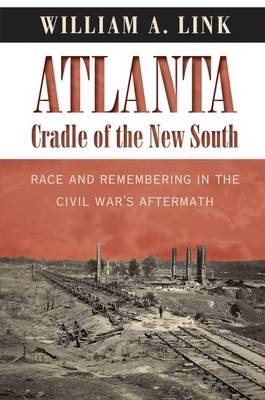
Atlanta, Cradle of the New South
Race and Remembering in the Civil War's Aftermath
Seiten
2015
The University of North Carolina Press (Verlag)
978-1-4696-2655-0 (ISBN)
The University of North Carolina Press (Verlag)
978-1-4696-2655-0 (ISBN)
The US Civil War's aftermath brought contentious transition from Old South to New for whites and African Americans alike. Historian William Link argues that this struggle defined the broader meaning of the Civil War in the modern South, with no place embodying the region's past and future more clearly than Atlanta.
After conquering Atlanta in the summer of 1864 and occupying it for two months, Union forces laid waste to the city in November. William T. Sherman's invasion was a pivotal moment in the history of the South and Atlanta's rebuilding over the following fifty years came to represent the contested meaning of the Civil War itself. The war's aftermath brought contentious transition from Old South to New for whites and African Americans alike. Historian William Link argues that this struggle defined the broader meaning of the Civil War in the modern South, with no place embodying the region's past and future more clearly than Atlanta.
Link frames the city as both exceptional - because of the incredible impact of the war there and the city's phoenix-like postwar rise - and as a model for other southern cities. He shows how, in spite of the violent reimposition of white supremacy, freedpeople in Atlanta built a cultural, economic, and political center that helped to define black America.
After conquering Atlanta in the summer of 1864 and occupying it for two months, Union forces laid waste to the city in November. William T. Sherman's invasion was a pivotal moment in the history of the South and Atlanta's rebuilding over the following fifty years came to represent the contested meaning of the Civil War itself. The war's aftermath brought contentious transition from Old South to New for whites and African Americans alike. Historian William Link argues that this struggle defined the broader meaning of the Civil War in the modern South, with no place embodying the region's past and future more clearly than Atlanta.
Link frames the city as both exceptional - because of the incredible impact of the war there and the city's phoenix-like postwar rise - and as a model for other southern cities. He shows how, in spite of the violent reimposition of white supremacy, freedpeople in Atlanta built a cultural, economic, and political center that helped to define black America.
William A. Link is Richard J. Milbauer Professor of History at the University of Florida, USA. He is author or editor of thirteen books, including Righteous Warrior: Jesse Helms and the Rise of Modern Conservatism.
| Erscheint lt. Verlag | 1.8.2015 |
|---|---|
| Reihe/Serie | Civil War America |
| Zusatzinfo | 16 halftones, 1 map, 1 table |
| Verlagsort | Chapel Hill |
| Sprache | englisch |
| Maße | 155 x 235 mm |
| Gewicht | 387 g |
| Themenwelt | Geisteswissenschaften ► Geschichte ► Regional- / Ländergeschichte |
| Geschichte ► Teilgebiete der Geschichte ► Kulturgeschichte | |
| Geschichte ► Teilgebiete der Geschichte ► Militärgeschichte | |
| Geschichte ► Teilgebiete der Geschichte ► Wirtschaftsgeschichte | |
| Sozialwissenschaften ► Politik / Verwaltung | |
| Sozialwissenschaften ► Soziologie | |
| ISBN-10 | 1-4696-2655-1 / 1469626551 |
| ISBN-13 | 978-1-4696-2655-0 / 9781469626550 |
| Zustand | Neuware |
| Haben Sie eine Frage zum Produkt? |
Mehr entdecken
aus dem Bereich
aus dem Bereich
der stille Abschied vom bäuerlichen Leben in Deutschland
Buch | Hardcover (2023)
C.H.Beck (Verlag)
23,00 €
vom Mittelalter bis zur Gegenwart
Buch | Softcover (2024)
C.H.Beck (Verlag)
12,00 €


